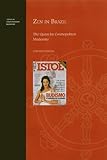Zen in Brazil : The Quest for Cosmopolitan Modernity / Cristina Rocha.
Material type: TextSeries: Topics in Contemporary Buddhism ; 23Publisher: Honolulu : University of Hawaii Press, [2005]Copyright date: ©2005Description: 1 online resource (272 p.) : 24 illus., 2 mapsContent type:
TextSeries: Topics in Contemporary Buddhism ; 23Publisher: Honolulu : University of Hawaii Press, [2005]Copyright date: ©2005Description: 1 online resource (272 p.) : 24 illus., 2 mapsContent type: - 9780824829766
- 9780824865665
- 294.3/9270981 22
- BQ9262.9.B6 R63 2006
- online - DeGruyter
- Issued also in print.
| Item type | Current library | Call number | URL | Status | Notes | Barcode | |
|---|---|---|---|---|---|---|---|
 eBook
eBook
|
Biblioteca "Angelicum" Pont. Univ. S.Tommaso d'Aquino Nuvola online | online - DeGruyter (Browse shelf(Opens below)) | Online access | Not for loan (Accesso limitato) | Accesso per gli utenti autorizzati / Access for authorized users | (dgr)9780824865665 |
Browsing Biblioteca "Angelicum" Pont. Univ. S.Tommaso d'Aquino shelves, Shelving location: Nuvola online Close shelf browser (Hides shelf browser)

|

|

|

|

|

|

|
||
| online - DeGruyter Women Through the Lens : Gender and Nation in a Century of Chinese Cinema / | online - DeGruyter Words Matter : Conversations with Asian American Writers / | online - DeGruyter Zen and Philosophy : An Intellectual Biography of Nishida Kitarō / | online - DeGruyter Zen in Brazil : The Quest for Cosmopolitan Modernity / | online - DeGruyter Zen Sand : The Book of Capping Phrases for Koan Practice / | online - DeGruyter The Last Tosa : Iwasa Katsumochi Matabei, Bridge to Ukiyo-e / | online - DeGruyter If It Swings, It's Music : The Autobiography of Hawaii's Gabe Baltazar Jr. / |
Frontmatter -- Contents -- Series Editor's Preface -- Acknowledgments -- Introduction -- 1. The Japanese-Brazilian Junction: Establishing Zen Missions -- 2. Non-Japanese Brazilians and the Orientalist Shaping of Zen -- 3. The Brazilian Religious Field: Where does Zen Fit In? -- 4. The Brazilian Imaginary of Zen: Global Influences, Rhizomatic Forms -- 5 Doing Zen, Being Zen: Creolizing ''Ethnic'' and ''Convert'' Buddhism -- Conclusion Translocal Flows: The ''Meditodrome'' as a Zen Style of Governing -- Notes -- Bibliography -- Index -- About the Author
restricted access online access with authorization star
http://purl.org/coar/access_right/c_16ec
Widely perceived as an overwhelmingly Catholic nation, Brazil has experienced in recent years a growth in the popularity of Buddhism among the urban, cosmopolitan upper classes. In the 1990s Buddhism in general and Zen in particular were adopted by national elites, the media, and popular culture as a set of humanistic values to counter the rampant violence and crime in Brazilian society. Despite national media attention, the rapidly expanding Brazilian market for Buddhist books and events, and general interest in the globalization of Buddhism, the Brazilian case has received little scholarly attention. Cristina Rocha addresses that shortcoming in Zen in Brazil. Drawing on fieldwork in Japan and Brazil, she examines Brazilian history, culture, and literature to uncover the mainly Catholic, Spiritist, and Afro-Brazilian religious matrices responsible for this particular indigenization of Buddhism. In her analysis of Japanese immigration and the adoption and creolization of the Sôtôshû school of Zen Buddhism in Brazil, she offers the fascinating insight that the latter is part of a process of "cannibalizing" the modern other to become modern oneself. She shows, moreover, that in practicing Zen, the Brazilian intellectual elites from the 1950s onward have been driven by a desire to acquire and accumulate cultural capital both locally and overseas. Their consumption of Zen, Rocha contends, has been an expression of their desire to distinguish themselves from popular taste at home while at the same time associating themselves with overseas cultural elites.
Issued also in print.
Mode of access: Internet via World Wide Web.
In English.
Description based on online resource; title from PDF title page (publisher's Web site, viewed 02. Mrz 2022)


